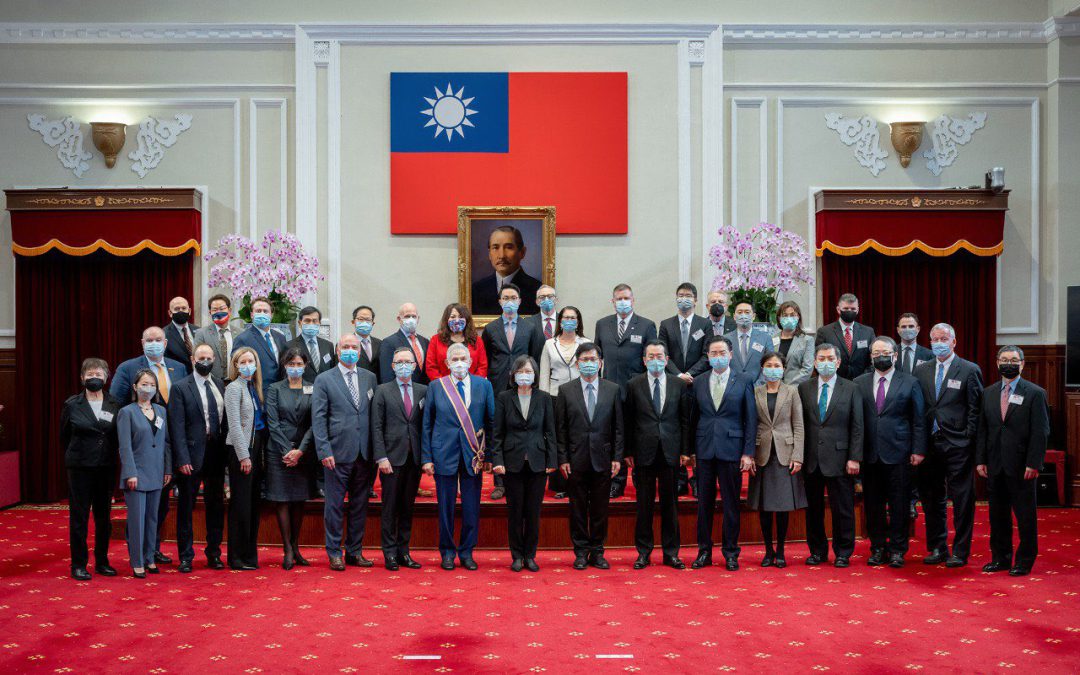February 8-10, 2023, Council Chairman Emeritus Paul Wolfowitz traveled to Taiwan together with President Rupert Hammond-Chambers, members of the Council’s Board of Directors, and a large delegation of company representatives. This delegation represented the first opportunity to visit with important Taiwan government and business leaders since the beginning of the Covid pandemic in 2020. Delegations like these offer USTBC member companies the opportunity to speak with political and business leaders to discuss bilateral relations and U.S.-Taiwan commercial and economic ties.
During their time in Taiwan, the delegation met with President Tsai Ing-wen, the Executive Yuan, the Legislative Yuan, the Ministry of Foreign Affairs, the Ministry of Economic Affairs, the Ministry of Digital Affairs, and the Ministry of Finance. The delegates also visited the Office of the Taiwan Trade Representative, the National Communications Commission, and the National Development Council. Finally, the delegation also met and exchanged ideas with the Taiwan External Trade Development Council (TAITRA) and with representatives from the American Institute in Taiwan.
Issues discussed during the many high-level meetings with Taiwan government officials and business leaders included:
- The status of U.S.-Taiwan bilateral political and business relations.
- Taiwan’s trade and economic policy priorities
- Progress on the Initiative on 21th Century Trade and other bilateral trade talks
- Potential for a U.S.-Taiwan Bilateral Trade Agreement
- Economic development initiatives undertaken by the Taiwan government
- Cross-strait trade and the future of Taiwan-China relations
- Taiwan’s defense and national security challenges
The Council looks forward to continuing our work to promote and improve bilateral trade and business relations between the United States and Taiwan.
Selected Photos
On the first day of the trip, February 8, 2023, the delegation met with Taiwan’s President Tsai Ing-wen.
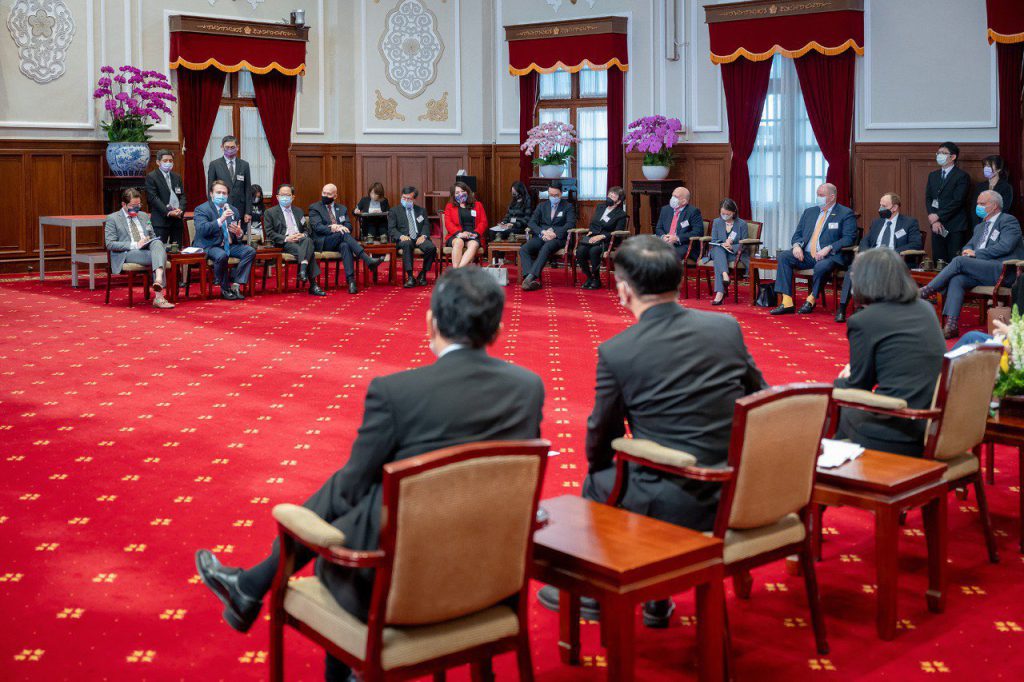
Part of the delegation at the Office of the President. Courtesy the Office of the President.
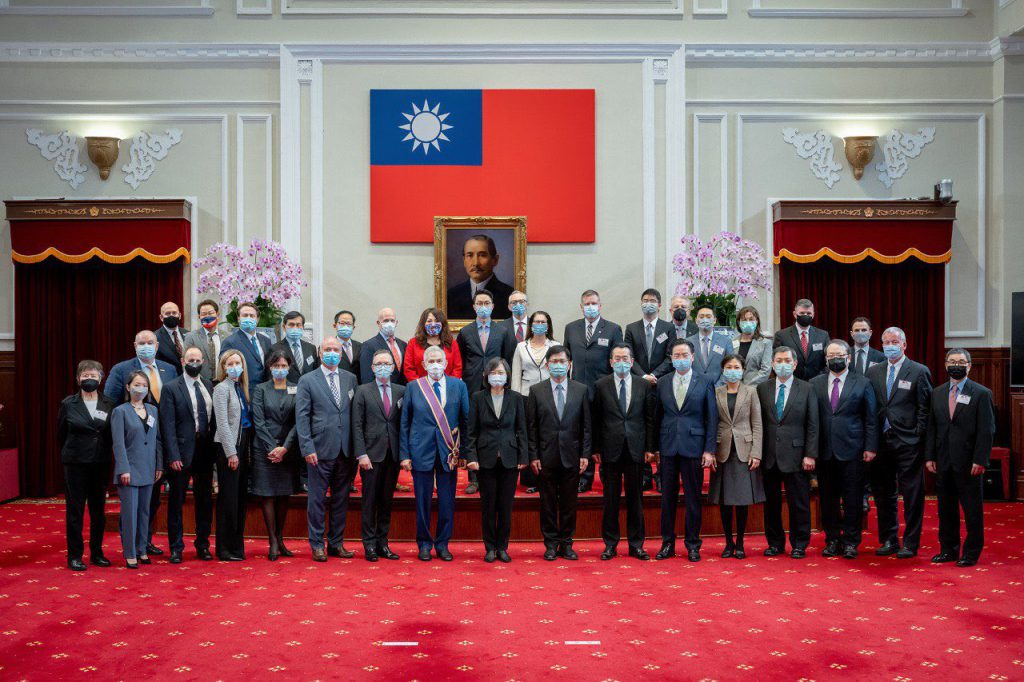
The 2023 delegation posing with Taiwan President Tsai Ing-wen. Courtesy the Office of the President.
During the presidential visit, Dr. Wolfowitz was conferred the Order of Brilliant Star with Grand Cordon. The US-Taiwan Business Council congratulates Chairman Emeritus Wolfowitz on this honor, and thanks Taiwan for recognizing Dr. Wolfowitz’ distinguished career and longstanding support for the U.S.-Taiwan bilateral relationship.
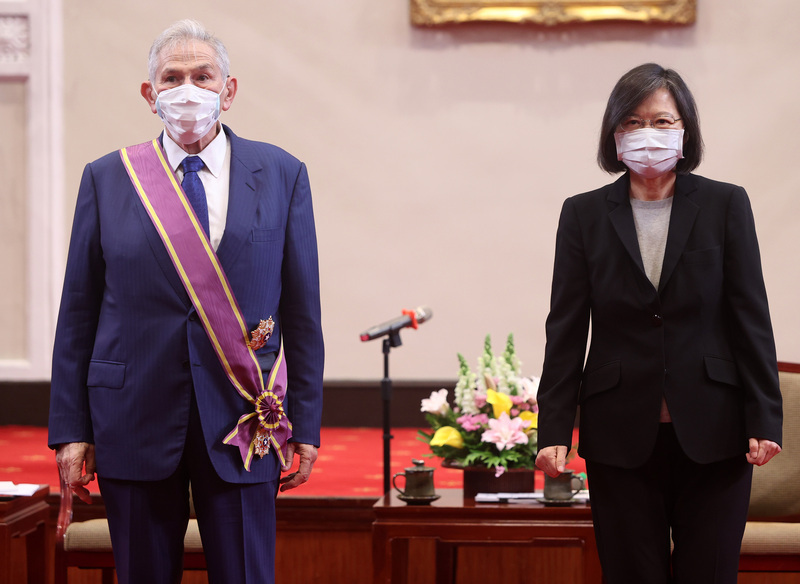
Paul Wolfowitz with President Tsai Ing-wen. Courtesy of the Office of the President.
On the second day of the trip, February 9, 2023, the delegation met with Legislative Yuan President You Si-kun.
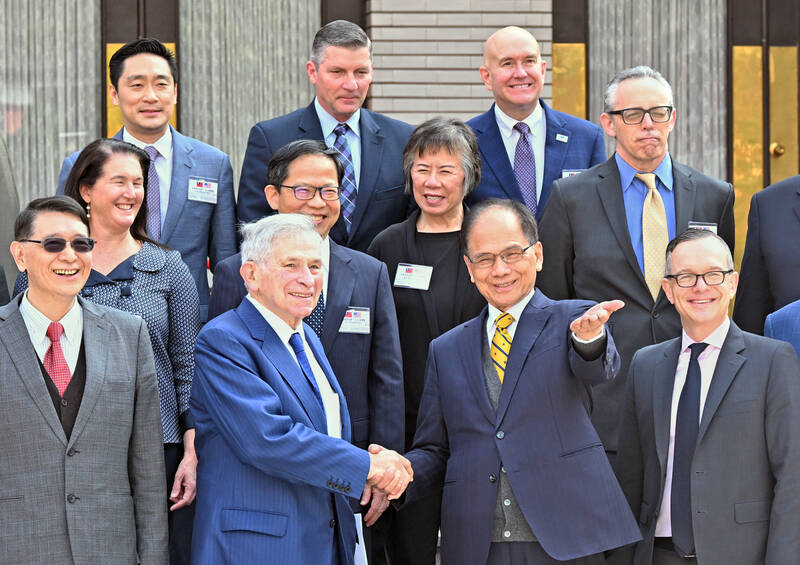
Delegation Meeting with Legislative Yuan President You Si-kun
On the last day, February 10, 2023, Minister of Economic Affairs Wang Mei-Hua hosted the delegation at a luncheon..
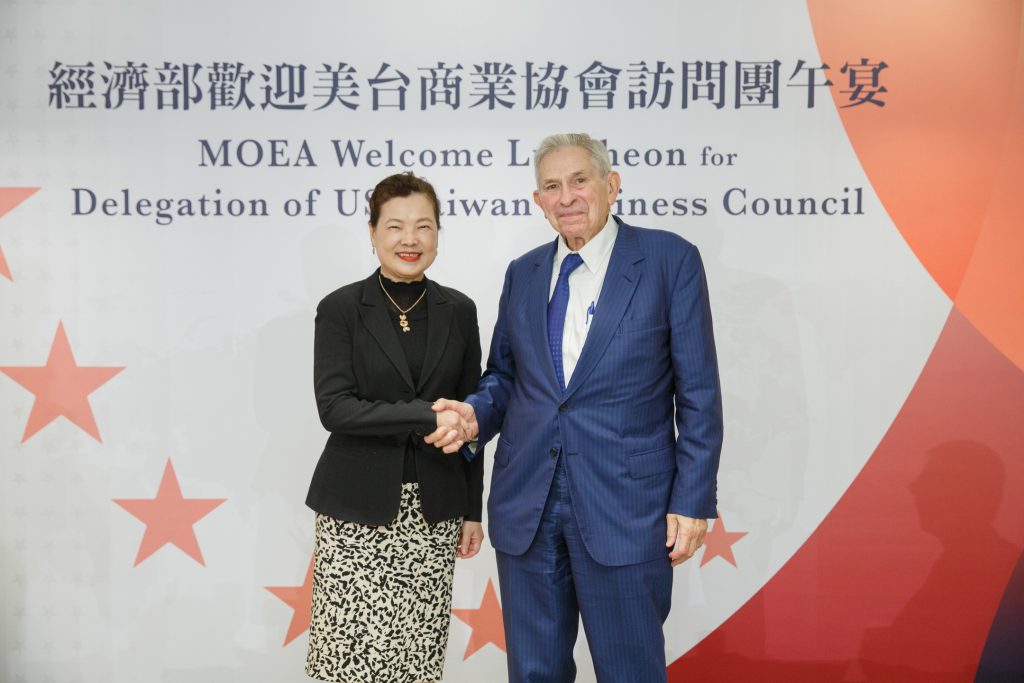
Paul Wolfowitz with Economics Minister Wang Mei-hua. Courtesy the Ministry of Economic Affairs.
At the luncheon, Minister Wang gave a speech to the delegation. The USTBC is pleased to share the speech here:
MOEA Speech (February 10, 2023)
1. Opening Remarks & Welcome to USTBC 2023 Delegation to Taiwan:
On behalf of the MOEA, I sincerely welcome all of you. I would especially like to express my gratitude to Ambassador Paul Wolfowitz for his long-standing and firm support of Taiwan-U.S. relations. My special thanks also go to President Rupert Hammond-Chambers and all the U.S. businesses present today for visiting Taiwan.
2. “We value the Taiwan-U.S. trade and economic relationship, and hope to facilitate further economic dialogue”:
Over the past three years, COVID-19 has disrupted people-to-people exchanges and mutual visits between Taiwan and the U.S. Fortunately, our bilateral trade and investment relationship has continued to grow rapidly during that same period. I am delighted to share with you the current status of the relationship and the progress we have made. I also look forward to discussing how to build upon our current foundation, and further strengthen Taiwan-U.S. economic partnership. In terms of bilateral trade, despite the severe challenges brought to the global economy by the pandemic and the Russian Invasion of Ukraine, Taiwan-U.S. cooperation has grown ever closer. The U.S. is our second largest trading partner, while Taiwan is the United States’ 8th largest trading partner. Our bilateral trade volume exceeded US$104 billion in 2021, and further reached US$120.6 billion in 2022, marking an annual increase of about 15%.
3. In terms of investment and industrial cooperation:
- For four years in a row, Taiwan has sent the largest delegation to the SelectUSA Investment Summit.
- This shows the support of the Taiwan business community in deepening the Taiwan-U.S. supply-chain partnership.
- The size of bilateral investment has also continued to increase.
- In particular, Taiwan’s direct investment in the United States reached a total of US$4.67 billion in 2020 and 2021, the highest in history.
- Together with Secretary of Commerce Gina Raimondo, we jointly launched the Technology, Trade and Investment Collaboration (TTIC) framework at the end of 2021.
- Under this framework, both sides have already initiated numerous cooperation programs in the areas of semiconductors, electric vehicles, and 5G.
- Last October, I also led a business delegation to Washington, and attended the Taiwan-U.S. Business Forum. In fact, I see some familiar faces from the Forum here today.
- During that visit, together with high-level U.S. Commerce officials, we witnessed the signing of 7 MOUs between Taiwan and U.S. companies in the areas of 5G and renewable energy.
In terms of promoting trade and economic integration, the two sides have started negotiations for the Taiwan-U.S. Initiative on 21st-Century Trade and made steady progress. The conclusion of the Initiative will help promote the harmonization of economic and trade regulations between Taiwan and the United States. Moreover, to enhance bilateral economic and trade integration, we hope to include the topic of market access (such as trade in services and tariffs) into future negotiations. This can further strengthen our supply chain partnership. In this regard, we will be seeking the support of the U.S. business community. In addition to these concrete outcomes, I would also like to highlight the U.S.-Taiwan Economic Prosperity Partnership Dialogue (EPPD), the most recent of which took place last December. Through the EPPD, both sides continue to engage in high-level talks and cooperation. I believe that under the frameworks of the EPPD and TTIC, Taiwan and the U.S. can enjoy closer and broader cooperation that leverage our unique advantages. We hope to further strengthen our global economic strategic partnership in the coming years.
4. “We invite U.S. companies to support the signing of ADTA”:
We consider all of you here to be important leaders in your industries. You will likely agree with me that to achieve the goal of promoting Taiwan-US investment and supply chain cooperation, in addition to regulatory harmonization (Taiwan-U.S. Initiative on 21st-Century Trade) and high-level economic dialogues (TTIC and EPPD), the most important leverage is to help businesses reduce tax burden and increase corporate profit. The annual AmCham Taiwan White Paper expressed support for the signing of the Avoidance of Double Taxation Agreement (ADTA) to develop a more favorable tax regime. Many Taiwanese companies investing in the U.S. have also expressed the importance of signing a Taiwan-U.S. ADTA. For instance, TSMC stated that the absence of ADTA increases its tax burden significantly. Many suppliers that have followed TSMC to the U.S. are also expressing similar concerns. An ADTA will play an important role in boosting bilateral investment and strengthening supply chain cooperation. My government has prioritized the signing of an ADTA with the United States, and we hope to gain the support of the USTBC and the U.S. companies here with us today.
5. Geopolitics and Taiwan’s Critical Role in Global Supply Chain:
Another important issue that you are probably monitoring is whether geopolitical factors will affect the security of foreign investment in Taiwan and Taiwan’s critical role in global supply chains. We are aware that a number of U.S. corporate members of AmCham Taiwan have received inquiries from their global headquarters with such concerns. A few days ago, AmCham Taiwan released the 2023 Business Climate Survey and pointed out that 47% of the surveyed member companies have adjusted or planned to adjust their business continuity plan to deal with the new geopolitical situation. Here I would like to let you know that although some company headquarters expressed concerns about Taiwan’s future development because of assessment reports by risk consulting firms or remarks by senior U.S. officials, our understanding is that approximately 75% of foreign subsidiaries or branches based in Taiwan believe that they should increase their investments here. Furthermore, the Survey conducted by AmCham Taiwan also indicated that 79% of respondents expressed confidence in Taiwan’s economic growth over the next three years. It is also worth noting that China has been actively spreading false information within Taiwan. When TSMC completed its Arizona fab for 5-nanometer chips in December 2022, some Chinese and Taiwanese media published articles about the “hollowing out [of] Taiwan,” which developed into talks that cast doubt on the United States. Regarding these concerns, I have stated to the public, and am reiterating here today with you all, that Taiwan will retain its advantage as a semiconductors production hub. As we continue to cooperate with the U.S. and global democratic allies, we are stepping up our cooperation with the U.S. in semiconductors and supply-chain resilience. Over the last couple years, Taiwan has continued to attract more foreign investors to invest in Taiwan, for example by setting up R&D hubs or logistics centers in Taiwan. Even after China’s military exercises in the areas surrounding Taiwan in August 2022, we continue to see increasing foreign investments in Taiwan from the U.S., Japan, and Europe, including Air Products from the U.S., TEL from Japan, as well as Siemens Gamesa and Merck from Germany. Merck held the groundbreaking ceremony for the new factory in Kaohsiung Semiconductor Science Park this Wednesday. Anand Nambiar, the Vice President of Merck said that the investment decision in Taiwan is based on a prudent risk assessment and the company has great confidence in its investment plans in Taiwan.
Meanwhile, we will continue to strengthen the resilience of our industries through actions such as enhancing energy security so that investors in Taiwan can benefit from a better and more secured business environment. As I think you all know, Taiwan has long been an important and reliable manufacturing partner for U.S. companies in the ICT and semiconductor industries. Looking at the output value in 2021, Taiwan is a global leader in many products, including motherboards and wireless LAN products. World-leading ICT businesses like TSMC and MediaTek are all from Taiwan, and Taiwan-U.S. cooperation is critical for the U.S. to maintain its edge over China. In addition, Taiwan is not only located along one of the most important shipping routes in the world, but also occupies a critical role in the global supply chain. Given Taiwan’s integration with the global supply chain, should anything happen to Taiwan, the global economy, including that of China’s, will be affected. If Taiwan cannot fulfill its role of stabilizing the global supply chain, there would also be an impact on U.S. interests. As delivered by President Tsai in her 2022 National Day Address, “the greatest duty for all of us living on this land is to do everything we can to give the next generation a better country, and to give the world a better Taiwan.” We believe that a more prosperous Taiwan also means a more complete and resilient global supply chain. I sincerely welcome all of you to include Taiwan as part of your global investment strategy and invite you to take concrete actions to strengthen Taiwan’s critical role in the global supply chain. All of you are critical links that support the strong Taiwan-U.S. economic and trade ties that exist today. I hope you will be able to convey these messages back to your colleagues on the ground.
6. Deepen Collaboration with the USTBC in the Future:
In closing, I once again welcome the USTBC delegation to Taiwan. In today’s discussion, I hope to listen to your views about Taiwan’s investment environment and how we can deepen our trade and economic ties. We hope to incorporate your suggestions into our work at the MOEA. Thank you.

